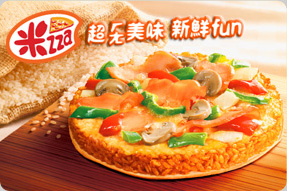 Something written with three different scripts (Chinese characters, zhuyin, and the roman alphabet) is very much the sort of thing that attracts my attention, as is a product that mixes scripts in its name. So this ad for a new product from Taiwan’s Pizza Hut definitely caught my eye, though it did not inspire me to actually taste the item being touted, which is a rice pizza. (Generally, I do not care for pizzas with Taiwanese characteristics, such as those with peas, corn, or squid. For that matter, I don’t even like pineapple on pizza.)
Something written with three different scripts (Chinese characters, zhuyin, and the roman alphabet) is very much the sort of thing that attracts my attention, as is a product that mixes scripts in its name. So this ad for a new product from Taiwan’s Pizza Hut definitely caught my eye, though it did not inspire me to actually taste the item being touted, which is a rice pizza. (Generally, I do not care for pizzas with Taiwanese characteristics, such as those with peas, corn, or squid. For that matter, I don’t even like pineapple on pizza.)
The name for this rice pizza, “米zza” (mǐzza), is a portmanteau — using two different languages and two different scripts, no less. 米 is the Chinese character for mǐ, which is used mainly in rice- and other grain-associated words. The second part of the word comes, of course, from “pizza.”
Let’s move on to the slogan:
米zza 超ㄏㄤ美味 新鮮fun
In romanization, this is
mǐzza: chāo hāng měiwèi — xīnxiān fun
Here we have Chinese characters (米zza 超ㄏㄤ美味新鮮fun), zhuyin (米zza 超ㄏㄤ美味新鮮fun), and the Roman alphabet (米zza 超ㄏㄤ美味新鮮fun). Three scripts in just one line! (Yes, yes, I know that a line in written Japanese will often have just as many scripts, if not more; but this is Mandarin.)
The zhuyin, ㄏㄤ, represent hāng, a new slang word that, according to several people I have asked, has appeared within the last five years at most. It means “hot” in the sense of “extremely popular right now.”
Also, there’s a possibility that the English word “fun” is meant to echo the Mandarin fàn (飯 / 饭/ “rice”). Such puns across languages are not uncommon here, especially in local Internet slang.
So, the whole slogan might be translated as “Rice pizza: the super-’hot’ delicious food — fresh, new fun.” Sorry, that’s not a very good translation; it works better in Mandarin.
I predict such portmanteaux and mixing will be increasingly common here in Taiwan, where code switching is a way of life for many people. “Mǐzza” could be the wave of the future — just not the culinary future, I hope.
source: Taiwan Pizza Hut menu page, accessed January 30, 2007

Can ? also be romanized as Pi in some system? I know that in Japanese it can be read as “bei” (as well as “mei”) and that b and p are almost the same in Chinese.
? doesn’t have a pronunciation other than MI3 in modern standard Mandarin. In Taiwanese it’s a little closer. (It’s one of those sounds in Taiwanese that I have a hard time getting quite right.) But I don’t think that a reading of anything other than MI was intended in this case. Pizza Hut Taiwan’s English Web site — well, sort of English — gives this for the product:
——
Mizza (Rice Pizza).
The novel personal meal using exotic flavored rice as base, spread with aromatic cheese and abundant great topping. It tastes surprisingly delicious that nothing can beat.
——
Yes, at least I would certainly be surprised if it’s delicious.
Does ? also imply “America,” as it does in Japanese? Due to phoenetics, America was referred to as ???? (a-me-ri-ka) back in the day and is now often shortened to ?? (beikoku). Of course, it has nothing to do with rice…
? doesn’t imply “America” in Mandarin. ? (m?i) is used for that here — short for M?iguó (?? / ??).
Impressive!
I’ve read that before WWII it was ?? in Japan, too — then they stopped calling the enemy “beautiful country” and haven’t gone back since.
Interesting that the two bopomofo letters are on top of each other. Apparently they’re supposed to fill the same space as every other syllable — like in Korean.
Did Mickey D’s “?tastic” campaign for the new rice burger ever reach Taiwan? It was pretty ubiquitous on billboards in Hong Kong a few months back. Also thought that was pretty clever…
Pingback: Pinyin news » A nose for foreign food?